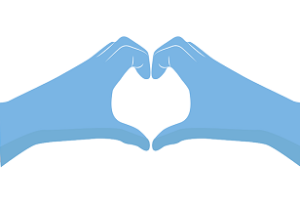From the Heart: COVID-19 Column

In this new article series, The Paper Point aims to help AAE resident and new practitioner members cope with the challenges of COVID-19 and our new reality by sharing perspectives and stories of Resident & New Practitioner Committee members and other young endodontists navigating these times. We are proud to showcase our first column by committee member Dr. Zahabiyah Tsiamwala!
As a new graduate, and newly minted endodontist, the world we are entering into today is much different than the one in which we first started residency. COVID-19 has forced the world at large to pause. It has forced us to re-imagine what we thought life would look like, where we chose to live, how we evaluate opportunities, and has forced us to do an inventory of our physical and mental well-being.
Though it is important to recognize, congratulate and establish our specialty, it is clear that in 2020, there are monumental conversations happening all around us. Whether it’s the development of a vaccine for COVID-19, police brutality, economic inequality and access to quality healthcare, national and international protests, it is clear that this is a year of action. In addition to serving the community from a clinical perspective, relieving pain and infections and working through a pandemic to keep our patients safe, it is imperative that as endodontists we also participate in the advancement of our communities. There is no contribution or perspective too big or small, and we should be at the forefront as healthcare workers, encouraging constructive change.
How we live, interact with one another, how we work and communicate, how we move around and travel — every aspect of our lives has been affected. Decisions made now and in the coming months will be some of the most important made in generations. Children already left behind will likely bear the brunt of the pandemic’s impact, whether through missing out on life-saving vaccinations, increased risk of violence, or interrupted education.
Many children, especially those in the poorest households and the poorest parts of the world, risk losing their lives to pneumonia, diarrheal diseases, malaria, HIV and other preventable diseases unless urgent action is taken to mitigate the spread of COVID-19. For instance, any further disruptions to immunization services will result in more children dying from pneumonia, which already kills around 800,000 children under the age of five every year – about 2,200 per day.
Nearly three quarters of the population in sub-Saharan Africa lack basic handwashing facilities at home, a fundamental mechanism to prevent COVID-19, leaving the already vulnerable people at further disadvantage. As many as 3 billion people lack handwashing facilities with soap and water available: 1.6 billion have facilities lacking soap or water, and 1.4 billion have no facilities at all. In short, for many people, the most basic and effective method of preventing the spread of COVID-19 is out of reach.
When school closure is instituted as a containment measure, such alternatives as distance education and online learning are deployed as alternatives in some countries. However, less than half of households around the world have access to internet. While 73% of urban households possess television, only 38% of rural households do so. The pandemic risks aggravating the learning crisis and leaving the most deprived children behind.
Children are also targets of social inequality and racial injustice, which is being highlighted city by city by civilian led protests, most recently unified after the killings of George Floyd, Breonna Taylor, and Ahmaud Arbery. There are numerous initiatives that Americans are joining from all walks of life, perspectives and resources to support this human rights issue in our country.
You may be asking, what can I do?
1. Follow simple and routine World Health Organization guidelines.
Properly wash your hands more often, avoid crowded spaces, avoid handshaking; if you are sick wear a mask and seek medical attention immediately.
2. Educate your families, friends and community.
Spread community awareness online and offline. Be responsible. Verify every news and information before sharing. Be a source of calm during this storm.
3. Volunteer.
Find opportunities to volunteer in your community. If there are older people or immunocompromised people, help them out. Help out vulnerable people in your community to pick up their groceries and medicine. Healthcare workers around the world are called to work in high demand and they might need your help looking after their children or looking after their parents while they attend to life-saving work in clinics and hospitals around the world.
4. Donate.
Find a reliable charity to donate. The UN Foundation and the Swiss Philanthropy Foundation for an example, just launched a coronavirus response fund. You can also support other campaigns such as “Stand Together to Beat Coronavirus” by Global Citizen urging that the G20 countries contribute financially to strengthen efforts by the World Health Organization.
5. Hold your government accountable.
Advocate for free testing, reliable information, paid sick leave, investments in science, and adequate healthcare for patients to seek medical and dental services.
As a new endodontist, I am proud to be a member of our specialty, and a member of our global community, which is why I encourage all of you to take action!
-Dr. Zahabiyah Tsiamwala
Rutgers Endodontics 2020




